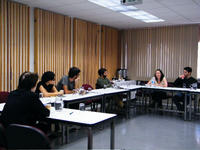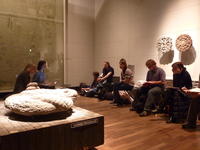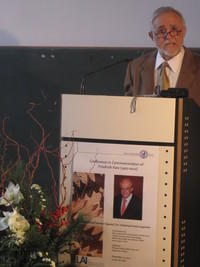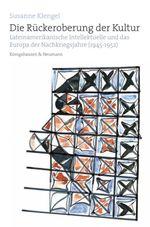Newsletter No. 9 - 02/09/2012
09.02.2012
Inhalt
Newsletter No. 9 – 02/09/2012
Dear members of the International Research Training Group ‘Between Spaces’ and those interested in the IRTG,
With this, the ninth issue of the IRTG ‘Between Spaces’ Newsletter, we would like to inform you about our news and current events.
News from the Coordination Office
The Coordination Office would like to appoint a new student assistant to help with the work of the International Research Training Group ‘Between Spaces’, the appointment beginning on April 1, 2012 (40 hours per month). Further information about the tasks and application process can be found here.
Please bring this vacancy to the attention of any students who might be interested in the position.
Office hours of the Coordination Office in the coming months:
Room 207 (Julia) Tues 3 – 5 pm
Room 222 (Ingrid) Tues 3 – 5 pm
New members of the IRTG
We are very pleased to welcome the following new members:
New scholarship holders
Ximena received her master’s degree in anthropology from the Diderot University of Paris with a thesis on the Chinese diaspora in Paris, and has a special interest in the cultural relationship between Asia and Latin America. The IRTG has awarded her a scholarship for further qualification.
Having been awarded a qualifying scholarship to prepare his dissertation, Carlos is now a member of the regular programme and has received a doctoral scholarship for the completion of a work in the field of political science on spaces and transnational security presences.
Yan was previously an associated PhD student of ‘Between Spaces’. At the end of 2011 he was admitted to the regular funding programme and has now received an IRTG grant to complete his doctorate. Yan works in the field of anthropology on Mesoamerican ball games.
New associated scholarship holder
Maria Lidola
Maria Lidola is a new associated PhD student at the IRTG. Maria works as a research assistant in anthropology at the Latin America Institute of Freie Universität Berlin. Her research project focuses on Brazilian small businesses in Berlin.
New Mexican scholarship holder
We are especially pleased to welcome a new Mexican PhD student:
Rosana Meireles Magalhães
Rosana works in the field of the cultural sciences on travelogues about revolutionary places: Cuba and Nicaragua. She will come to Berlin in 2012 to present her project and pursue her research.
We would like cordially to welcome all new members of the IRTG and look forward to working with them!
Visiting Scholars at the IRTG Berlin/Potsdam
February 5-11, 2012, Bernd Hausberger (El Colegio de México, IRTG Mexico)
March 31 - April 15, 2012, Liliana Weinberg (UNAM, IRTG Mexico)
April 21-27, 2012, Alberto Aziz (El Colegio de México, Ciesas, IRTG Mexico)
Nina Elsemann: Winner of the 2011 Friedrich Meinecke Prize
We would like to congratulate our alumni Dr. Nina Elsemann, who was awarded the 2011 Ernst Reuter Prize, and now also having received the 2011 Friedrich Meinecke Prize of Freie Universität Berlin for her dissertation Umkämpfte Erinnerungen. Die Bedeutung lateinamerikanischer Erfahrungen für die spanische Geschichtspolitik nach Franco (Contested Memories. The Significance of Latin American Experiences for the Spanish Politics of History after Franco). The Friedrich Meinecke Institute gives the Prize annually for outstanding dissertations. The award ceremony took place on December 13, 2011.
Further information on the book may be found here (in German):
Important: Call to take part in the Long Night of the Sciences!
Again this year the Institute for Latin America Studies of Freie Universität Berlin will take part in the Long Night of the Sciences. The Long Night will take place on June 2 and this year the Institute has taken the IRTG’s motto as its own: ‘Latin America – Between Spaces’. We therefore call upon all those associated with the IRTG and interested in cooperating in the event to take part. All suitable contributions are welcome: pictures, films, lectures, performances, suggestions, ideas, music ….
Send concrete suggestions, ideas and wishes as soon as possible to entre-espacios@lai.fu-berlin.de
Reports on events of recent months
November 17, 2011, Lecture Series: Martha Zapata, ‘El paradigma de la interseccionalidad en los Estudios de Género en América Latina’
On November 17, 2011, another instalment of the IRTG lecture series took place. Martha Zapata Galindo, an associate researcher of our Research Training Group, gave a talk on ‘El paradigma de la interseccionalidad en los Estudios de Género en América Latina’. Zapata Galindo’s starting point was the assumption that the term ‘intersectionality’ had its origin in the European and North American gender research of the 1990s, and thus provides a re-telling of the history of ‘gender studies’ (which, for example, would draw on black feminism). She then undertook to furnish a critical and conceptual cartography of the term by tracing how it has been received and has circulated in the Latin American discussion, and how far it is relevant and present in Latin American gender research. Her cartography took its bearings by a political epistemology of globalisation that poses the question of asymmetries, of specific spaces and circulation. The key to her approach lies in the study of non-hegemonic feminism in Latin America, which has long been formulating alternative concepts to treat the problem of the nexus of race, class and gender, and has moreover constructed a specific problematisation of the gender question. Zapata Galindo emphasized the differences among Latin American academic women’s movements and how social politicians have reinterpreted the reception of the term ‘intersectionality’ and adapted it to new realities.
(Kaciano Gadelha, IRTG Berlin/Potsdam)
November 24, 2011, Workshop with Marianne Braig (IRTG Berlin) and Marisa Belausteguigoitia (IRTG Mexico): ‘Autorización para hablar: Los derechos humanos como metatexto que permite hablar a los subalternos’

On November 24, 2011, at the Colegio de México, Marianne Braig and Marisa Belausteguigoitia gave a workshop on the use of human rights discourses by subaltern sections of society. The discussion took as its point of reference the theses of Gayatri Spivak. In her lecture, Braig, a political scientist, elucidated how oppressed sections of society can take up a relation to appropriate human rights discourses. Following a description of the development and regional significance of human rights, and an analysis of the claim to universality of the Declaration of Human Rights, Braig pointed out how, for example, the Zapatistas in Mexico referred to human rights. Marisa Belausteguigoitia, the Director of the Programme for Gender Studies at UNAM, discussed key statements of Subaltern Studies, in the course of which she presented individual theses of Spivak’s book Righting Wrongs (2008) and combined these with case studies from current social movements. This resulted in a lively and critical discussion of Spivak’s theses.
(Sherin Abu-Chouka, IRTG Mexico)
November 24, 2011, Lecture Series: Viola König, ‘Cartographic Communication, Spatial Order and its Presentation in Pre-Columbian Mexico and the Early Colonial Time’

Using facsimiles of pre-Columbian codices and the Lienzo Seler (also called the Lienzo de Cohaixtlahuaca) from the mid-sixteenth century, a hybrid representation combining European and pre-Columbian cartographic elements, König gave a lively presentation of her theses on Mesoamerican cartography. Her main thesis was that we can speak of ‘mapping’ in the Mesoamerican tradition, but that this is not like European cartography because it is not primarily concerned with the facsimile reproduction of an area. According to König, who delivered her talk in English, ‘mapping’ in the Mesoamerican tradition need not have something to do with geographical spaces, as it does in the European tradition. It is rather concerned with the representation of events at definite places. Further, Mesoamerican cartography is based on a principle of linearity, which maps villages and important places in a row. This cartographic tradition also combines other elements such as information about mythological events, creatures and calendar references and detailed written information on the time intervals between places. Up to now no archaeological findings have indicated that, before the collision with the Spanish, two-dimensional facsimile maps such as were known to Europeans were in use in Mesoamerica. Whereas Spanish cartography aimed at as complete a representation of terrain as possible, in which all spaces between any two points were marked, König argued that for the Mesoamerican peoples spaces between ‘points’, that is, important villages or markets, were without significance and accordingly not expressly recorded on maps. Thus Spanish and Mesoamerican forms of representation of cartographic material and their related purposes were very different.
(Yan Geoffroy, IRTG Berlin/Potsdam)
December 12, 2011, Conference in Commemoration of Friedrich Katz (1927-2010) with John Coatsworth (Columbia University), Enrique Semo (Universidad Nacional Autónoma de México), Claudio Lomnitz (Columbia University), Emilio Kouri (University of Chicago), Walther Bernecker (Universität Erlangen-Nürnberg), Hans-Jürgen Puhle (Johann Wolfgang Goethe Universität, Frankfurt) and Hans Werner Tobler (Eidgenössische Technische Hochschule Zürich)
Organised by: Marianne Braig (IRTG Berlin/Potsdam), Stefan Rinke (IRTG Berlin/Potsdam) and Stephanie Schütze (IRTG Berlin/Potsdam)

Those taking part in the memorial conference for Friedrich Katz included staff, doctoral candidates and students of the Institute for Latin American Studies of Freie Universität Berlin and many of his former colleagues in Latin American Studies from the Ibero-American Institute, the Humboldt University and from all over Germany. The presence of Friedrich Katz’s family, his wife Jana and his children Leo Katz and Jacqueline Ross from the United States and his cousins from Switzerland and France, gave the conference a festive mood. The lectures as a whole presented a rounded picture of Katz’s life and work and his great importance for Latin American Studies. The morning panel discussed Katz’s multi-faceted life and work between Berlin and Vienna, Mexico City and Chicago. The afternoon panel was devoted to an appreciation of his work from the perspective of historiography. The conference lectures were filmed. They will be edited and made available at the website dedicated to Katz, who held an honorary doctorate from Freie Universität Berlin, at the LAI’s homepage.
(Stephanie Schütze, IRTG Berlin/Potsdam)
December 13, 2011, Workshop of the IRTG Berlin/Potsdam with representatives of Columbia University, New York, for the development of joint research perspectives and scholarly cooperation
On December 13, 2011, a workshop took place at the Harnack Haus of the Max Planck Gesellschaft to which the IRTG had invited professors and doctoral candidates of the Institute of Latin American Studies of Columbia University, New York, so as to develop joint research perspectives and discuss and plan possibilities of scholarly cooperation. Taking part from the IRTG were the professors, post-graduate students and some doctoral candidates. Following a presentation of both institutions and their research programmes by Stefan Rinke, Ingrid Kummels and Pablo Piccato (Director of the Institute of Latin American Studies at Columbia University), a plenary session discussed the structural requirements and possible institutional and personal linkage for a scholarly exchange. One particular possibility discussed was that of ‘visiting scholarships’ at Columbia for IRTG doctoral candidates and post-graduates. In the following block of events, small working groups developed networking possibilities for individual projects. The meeting served as an impetus and forum for planning promising exchanges with a partner located in the exciting research centre of New York, and was pleasantly rounded off over the Christmas menu at the Landauer restaurant.
(Stephanie Fleischmann, IRTG Berlin/Potsdam)
December 14-16, 2011, Research colloquium: ‘Espacios en movimiento - Transformaciones, constituciones y reconfiguraciones de las Américas en la larga edad de la globalización’
Organised by: Philip Gondecki (Rheinische Friedrich-Wilhelms-Universität Bonn) and Romy Köhler (IRTG Berlin/Potsdam)
The research colloquium ‘Espacios en movimiento - Transformaciones, constituciones y reconfiguraciones de las Américas en la larga edad de la globalización’ took place on December 14-16, 2011. It was organised by Philip Gondecki, a doctoral student in ancient American studies (ethnology), at the University of Bonn, and Romy Köhler, a doctoral student in ancient American studies and cultural anthropology at Freie Universität Berlin, as part of the funding programme for holders of scholarships from Studienstiftung des Deutschen Volkes (German National Merit Foundation). Taking part in this trans-disciplinary colloquium were doctoral students from such various disciplines as law and ethnology, literary studies and history, development studies, ancient American studies and cultural anthropology. The contributions analysed from transdisciplinary perspectives and over a long period of time the formative processes, initiated by various actors, of physical, linguistically represented, urban, political, legal, virtual and imagined spaces. They will be collected by junior researchers in a volume of articles that will be published in 2012 as part of a series in Indiana, the journal of the Ibero-American Institute of the Prussian Cultural Heritage Foundation.
(Romy Köhler, IRTG Berlin/Potsdam)
January 19, 2012, Lecture Series: Barbara Göbel, ‘Conocimientos ambientales en la Puna de Atacama: dimensiones locales y globales’
As part of the IRTG lecture series, Barbara Göbel, Director of the Ibero-American Institute, Berlin, directed our attention to ethnological research concerning ‘Environmental Knowledge among the Puna of Atacama: Local and Global Dimensions’. With great detailed knowledge of this indigenous population of the north-western highlands of Argentina, based on long and repeated field research, she presented an example of the transformation processes in peripheries brought about by globalisation. This fascinating ethnographic case study made clear that, in addition to visible social, economic and political upheavals, changes have triggered a rapid, sometimes strategically designed and radical transformation of culturally specific environmental perception in the indigenous inhabitants of the Atacama.
(Adrian Waldmann, IRTG Berlin)
Book Publications
Susanne Klengel (IRTG Berlin): Die Rückeroberung der Kultur: Lateinamerikanische Intellektuelle und das Europa der Nachkriegsjahre (1945-1952) (Reclaiming Culture: Latin American Intellectuals and Post-War Europe (1945-1952))

Immediately after the Second World War, a number of Latin American intellectuals, men and women, visited a Europe still marked and shaken by the disasters of war. Their main destination was Paris, the once longed-for city of Latin American elites and their epitome of European civilization. Yet this Old World, with its natural claim to cultural superiority, no longer existed. Many of these visitors now encountered the former model, which for its part hoped to find a difficult path between East and West, critically and as equals. They negotiated a new scope of dialogue and action, took part in the cultural reconstruction of this world, and became visible in positions and functions that before the war would have been unimaginable. They committed themselves to reclaiming culture from barbarism by appealing to humanist principles, which now had to acknowledge with genuine comprehensiveness the equality of man and cultures. This short span of common cultural-political negotiation and action fell into oblivion when the Cold War increasingly turned attention to East-West relations. Susanne Klengel’s book seeks to make again accessible this historical interspace (1945 to 1952), which anticipated some of today’s post-colonial discussion, and its actors, voices and policies.
Further information on the book may be found here.
Events in the coming months
IN BERLIN/POTSDAM:
Interdisciplinary Colloquium
February 14, 2012, 6 – 8 pm, room 243
Clarissa Heisig, ‘La conformación de élites gubernamentales mexicanas en las administraciones del Partido Acción Nacional’
Guests are welcome. Please register at entre-espacios@lai.fu-berlin.de
The full programme of the Interdisciplinary Colloquium is available here.
Lecture Series (Ringvorlesung)
February 09, 2012, 6 – 8 pm, LAI, room 214
Tanja Börzel (FU Berlin): ‘From Europeanisation to Diffusion: Transformative Power Europe?’
Guests are welcome.
The full programme of the meetings of the lecture series is available here.
February 9, 2012, 2-6 pm, LAI, room 243
Workshop Bernd Hausberger (IRTG Mexico): ‘Viva Villa!: La creación de una memoria histórica global’
Bernd Hausberger, Professor of History at the Colegio de México and member of the IRTG in Mexico, will present a historically highly interesting film on the Mexican revolution Viva Villa! (1934), followed by an opportunity for discussion.
Guests are welcome. Please register at entre-espacios@lai.fu-berlin.de
April 12, 2012, 2-4 pm, LAI, room 243
Workshop with Liliana Weinberg (IRTG Mexico): ‘Entre-ensayos. Prosa de ideas y formas de sociabilidad en América Latina’
Liliana Weinberg, Professor of Literature and Cultural Studies at the UNAM in Mexico, member of the IRTG in Mexico, and a specialist in essay research, will hold a workshop in which she will acquaint us with her latest work on the Latin American essay, which she sees as a global genre.
April 26, 2012, time and room to be announced
Writing Workshop with Paul Talcott: Academic Writing
Paul Talcott, a specialist in courses on academic writing, will hold a workshop for doctoral candidates of the IRTG Berlin/Potsdam in which he will specifically address the problems facing dissertation writers in the final stages of their work. In the second part of the workshop, Talcott will respond to and discuss concrete questions and problems of the participants.
This workshop has been arranged exclusively for Berlin/Potsdam and is not open to the public.
IN MEXICO:
Inter-institutional Colloquium
February 6, 2012 , 4 pm, Office of the IRTG in Mexico, Callejón de las Flores No.1, Col. Barrio del Niño Jesús, Delegación Coyoacán
Sebastián Rivera (IRTG Mexico)
José Alberto Moreno Chávez (IRTG Mexico)
February 20, 2012, 4 pm, Centro de Investigaciones y Estudios Superiores en Antropología Social (CIESAS)
Presentation and discussion of the following texts:
*Kliksberg, Bernardo/Sen, Amartya (2007): Primero la gente. Una mirada desde la ética del desarrollo a los principales problemas del mundo globalizado, Barcelona: Ediciones Deusto, Chapter 1: ‘¿Cómo juzgar la globalización?’, pp. 13-26, Chapter 2: ‘Exclusión e inclusion’, pp. 27-42.
Presented and commented on by Lorenza Villa Lever (IRTG Mexico).
* Castells, Manuel (2002): La era de la información, VOL. II, El poder de la identidad, Edición de Siglo XXI. Chapter 6: ‘La política informacional y la crisis de la democracia’, pp. 271-402.
Presented and commented on by Alberto Aziz (IRTG Mexico).
* Guarnizo, Luis Eduardo/ Smith, Michael Peter (1998): ‘The Location of Transnationalism’, in: Smith, Michael Peter / Guarnizo, Luis Eduardo (eds.): Transnationalism from Below. Comparative Urban and Community Research V6, New Brunswick: Transaction Publisher, pp. 3-31.
Presented and commented on by Carlos Alba Vega (IRTG Mexico)
March 12, 2012, 4 pm, PUEG of UNAM
Presentation and discussion of the following texts:
* Pernilla S. Rafiqui (2009): ‘Evolving Economic Landscapes: Why new institutional economics matters for economic geography’, in: Journal of Economic Geography 9, pp. 329–353.
Presented and commented on by Carlos Riojas (IRTG Mexico).
*Walter D. Mignolo (2000): Local Histories/Global designs. Coloniality, Subaltern Knowledges and Border thinking, Princeton: Princeton Press, Chapter: ‘Border Thinking’, pp. 49-88 and ‘Afterword: An Other Logic’, pp. 313-338.
Presented and commented on by Marisa Belausteguigoitia (IRTG Mexico).
The full programme of the sessions of the Inter-institutional Colloquium is available here.
For more information on our programme and activities, please consult our website: www.entre-espacios.de
Best wishes,
Ingrid Simson and her team




